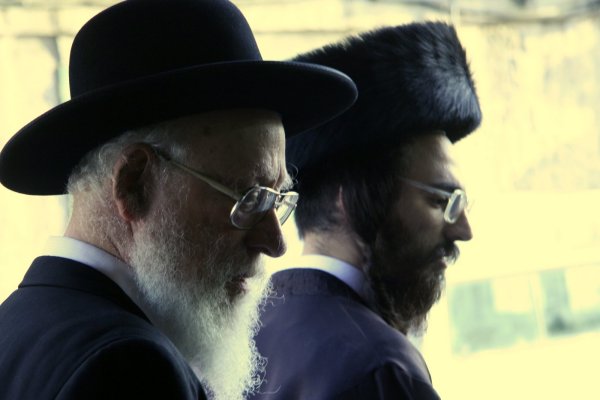The Israeli government’s decision to reverse math and English learning requirements for the country’s ultra-Orthodox schools could deal a serious blow to Israel’s vital technology industry and seems to fly in the face of the wishes of the ultra-Orthodox community itself.
On July 24 the Israeli government announced that Haredi (ultra-Orthodox) schools do not have to teach math, science and English to qualify for state funding. The original law, introduced by former education minister Shai Piron, was killed as part of coalition talks with ultra-Orthodox parties.
“Ultra-Orthodox men who lack basic English and math skills from a young age find it very hard to integrate into the hi-tech world. Cancelling the law that would have required cheders (ultra-Orthodox schools) to study a core curriculum, can be seen as a harsh blow to the national effort to integrate Haredim into the realm of hi-tech,” said Gilad Malach, a researcher at Israel Democracy Institute.
Poor timing
The news comes at a time when ultra-Orthodox workforce participation is at an all time high and the government is desperately looking for solutions to avoid any disruption to Israel’s burgeoning tech industry. Avi Hasson, Chief Scientist of the Ministry of Economy, said that the country is facing a shortage of about 10,000 engineers and programmers.
Encouraging developments in the ultra-Orthodox community show that talk of manpower shortages might be premature as for first time in the country’s history workforce participation rate among ultra-Orthodox men is over 50%, compared to 86% in the general population.
The increase from low 30s in 2003 to over 50 can be partly attributed to welfare cutbacks, but also to the explosive expansion of Israel’s high tech and strong economic growth visible not only in Tel Aviv, but also in Haifa, Jerusalem and Beersheba.

Jerusalem. Photo courtesy of Flickr/Felix Abraham.
Today the ultra-Orthodox in Israel comprise 11% of the population and about 8% of the workforce. In 20 years time, according to Kamatech, an organization that facilitates the integration of Haredim into the Israeli hi-tech workforce, the number of ultra-orthodox will be 18%, and by 2030, 40% of the population.
“Israel’s ultra-Orthodox community is in the midst of a revolution, both in terms of women in the workplace and employment in general. However, given that their leadership encourages the men to continue with Torah study, rather than employment, all the progress that is being made must take place quietly, without the explicit support of the rabbinic leadership,” said Goel Jasper, managing director of Finn Partners Israel. Jasper works with ultra-Orthodox organizations to integrate their community into the hi-tech work-force.
“Behind the scenes, on a case-by-case basis, even the women are encouraged to seek employment, and the hi-tech sector is right in the middle of the action,” Jasper said.
A survey from July last year showed that the number of ultra-Orthodox employees in the business sector doubled from 8 percent in 2008, to 16% in 2015.
Interestingly, 67% of businesses employing ultra-Orthodox are secular. In addition to the increase in participation, Haredim are also joining combat and intelligence units. In 2014, 2,300 enlisted up from 288 in 2007. Considering that Israeli tech owes much of its success to the army and its special units, the uptick in Haredi soldiers is a sign of deepening integration.
Indeed, workforce participation among Israeli women and men ultra-Orthodox is trending up and new initiatives are working to bridge gap between the secular and the religious.
In another sign of deepening ultra-Orthodox involvement, a Ministry of Economy report released in mid-July showed that the percentage of Haredi working women climbed to 73.1% in 2015, from 61.5% in 2010. The initial goal of 63% was reached five years ahead of schedule.
“Perhaps the most fascinating and important development here is that ultra-Orthodox women are working in hi-tech by the thousands, which means that they are almost certainly gaining a more worldly outlook. This is sure to impact every aspect of ultra-Orthodox life in the coming decade and beyond,” said Jasper.
Indeed, workforce participation among Israeli women and men ultra-Orthodox is trending up and new initiatives are working to bridge gap between the secular and the religious.
Encouraging developments might be short-lived as the government’s decision to cut the Haredim from the mainstream will put a question mark on Israel’s ability to keep the tech engine running in the future.
“We now find ourselves at a critical junction: If the education minister will truly work to incentivize institutions that are interested in teaching the core curriculum, and help to train teachers and provide proper books in cooperation with interested parents, I think we will see a gradual integration of English, math, science and other core subjects into even the most conservative Haredi institutions,” said Malach.
“Alternatively, if the education minister does not do anything to advance these subjects, then the situation will continue as it is today. We will only see the results of this policy in about 15 years, when many Haredim have entered hi-tech.”
